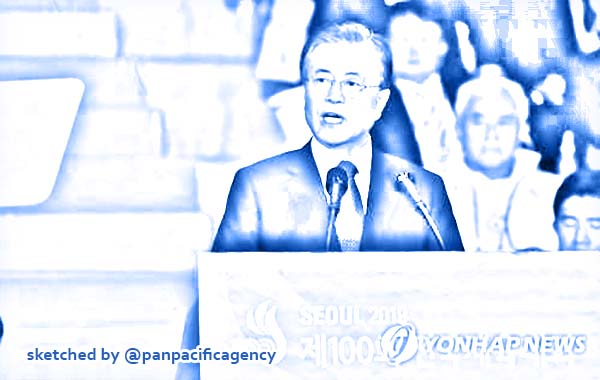[Analytics] Moon’s populist politics and its effects

President Moon Jae-in delivers a speech during the opening ceremony of the 100th Korean National Sports Festival at Jamsil Sports Complex in Seoul on Oct. 4, 2019. (Yonhap). Sketched by the Pan Pacific Agency.
South Korean President Moon Jae-in said in a meeting at the Blue House that his administration had produced ‘miraculous change in the situation on the Korean Peninsula’. But Moon’s praise of his government’s performance does not appear to be well-founded, as his politics have generated public anxiety about not only the North Korean nuclear threat — exacerbated by continued tests in December — but also about the country’s ongoing political and economic crises. Hyung-A Kim specially for the East Asia Forum.
Domestically, South Korea is in political turmoil once again. Moon’s Democratic Party railroaded 2020’s budget bill (of US$430 billion) with the support of four minor parties after adjustments behind closed doors in the National Assembly on 10 December 2019, despite protests from the main conservative opposition Liberty Korea Party (LKP). Since then, political deadlock continues, especially over two controversial fast-tracked reform bills. The feud between the ruling party and the LKP has become even more fierce, to the extent of the parliament conducting a filibuster over three days in the last week of December. This essentially demonstrates the nature of political impasse during 2019.
A key development is Moon and his Party’s push to pass the two fast-tracked bills — one on electoral revision for a new proportional representation system and the other to establish an independent anti-corruption agency to scrutinise allegations against senior public officials. These bills and two other contentious reform bills were initially fast-tracked in April when the ruling party and three minor parties made a deal amid scuffles with the LKP. The LKP maintains that the process to fast-track the reform bills was illegal and that they should be cancelled.
Even if the ruling party succeeds in these controversial bills, they may risk a possible voter backlash. There is also widespread mistrust of Moon’s policies and of Democratic Party Chairman Lee Hae-chan’s bullish declaration of the Party’s aim to ‘occupy the Blue House for two decades’.
At the centre of Moon’s controversy stands the ongoing Cho Kuk scandal. It began when Moon appointed Cho as the new justice minister in September despite an indictment of his wife for forgery and 13 other charges. And state prosecutors have now requested a warrant be issued for his arrest for various alleged abuses of power.
The forgery by Cho’s wife to help her daughter gain admission into an elite university shocked the country. Angry students in particular ignited large protests that forced President Moon to apologise and his Justice Minister to resign within 35 days of appointment. It also exposed the Moon administration’s double standards, particularly regarding fairness, justice and equality — promises that Moon made in his 2017 inauguration speech.
As a law professor and Moon’s former senior secretary for civil affairs, Cho led Moon’s signature anti-corruption reform of ‘accumulated old evils’ and directed South Korea’s anti-Japan campaign through state-led nationalism. He provoked public forums by using coded language to refer to his opponents as ‘pro-Japanese’ and ‘traitor’. Cho is now regarded by many in the South Korean public as the ‘epitome of unfairness and hypocrisy’ and his scandal has revealed a breakdown of morality among the administration’s progressive political elites. This is not to overlook the oddity that Moon’s loyal ‘candlelight supporters’ and many left-wing civic movement organisations have fiercely defended Cho by equating him to Moon himself, particularly in their mutual demand for prosecutorial reform.
The conflict between the pro-Cho force, who are predominantly supporters of the progressive candlelight protests, and the anti-Cho force, who are largely supporters of conservative rallies under the national flag, for example, exposes the weakness of Moon’s leadership.
Of greatest concern to the South Korean people are their current economic difficulties largely due to the flow-on effects of minimum wage hikes and shorter working hours driven by Moon’s populist ‘income-led growth policy’.
Economist Robert Barro argues that South Korea’s ‘wonderful economic success’ is being squandered by Moon’s ‘income-led growth’ policy and should be referred to as ‘income-led poverty’ instead. It is not surprising that young people, the working class and women reportedly began turning their backs on Moon in 2019. According to the Financial Times, ‘South Korea [is] set for one of the worst growth periods in half a century’ with only 2.3 per cent GDP growth expected in 2020.
Inter-Korean relations are no less troublesome. There were high expectations of peace on the Korean Peninsula, especially after the historic US–North Korea summit in Singapore and the three inter-Korean summits. But the collapse of the second Trump–Kim summit in Hanoi in February 2019 dramatically changed the situation on the Peninsula. In addition to the increased military tension amid ‘re-enacted brinkmanship’ between the United States and North Korea and its 13 missile launches since May 2019, US President Donald Trump is pressuring South Korea to make a five-fold larger contribution to military cost sharing. It appears that the ‘miraculous change’ Moon referred to has yet to be realised.
Moon’s populist politics will challenge the South Korean people in 2020, perhaps even reshaping their political future. Whoever wins the legislative elections in April 2020 will be well placed going into the presidential poll in 2022.
Hyung-A Kim is Associate Professor of Korean politics at the School of Culture, History and Language, the Australian National University.